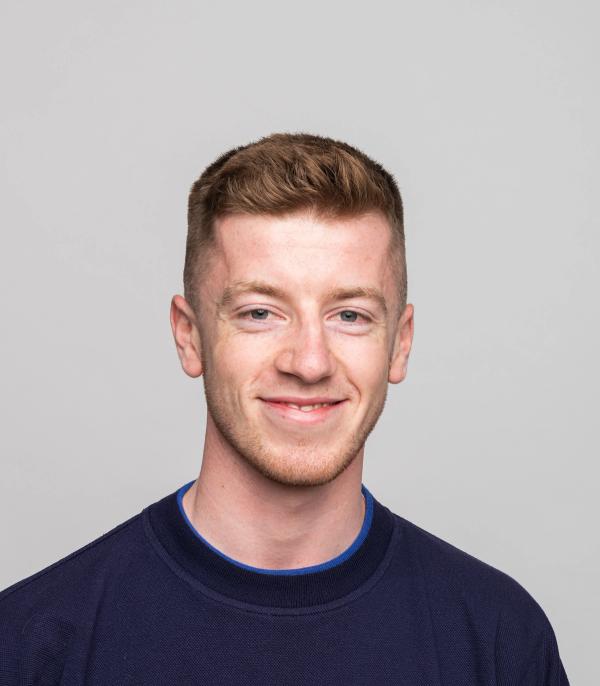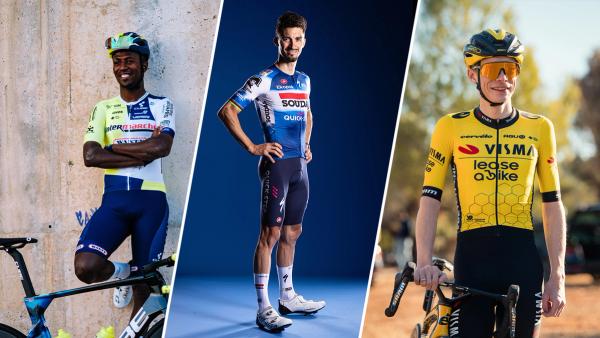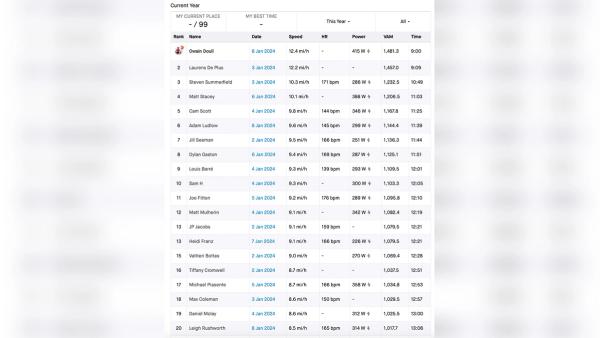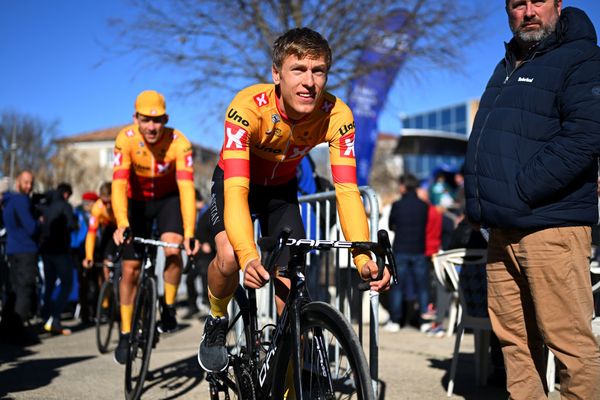Davide Rebellin: 'A boy that enjoyed the bike more so than everything'
A year on from his tragic death, GCN speaks to some of the riders who crossed paths with the Italian during his 30-year career
Pete Trifunovic
Digital Content Creator
© Velo Collection (TDW) / Getty Images
Davide Rebellin was the first-ever Ardennes Classics triple winner in 2004
It is often the case that some professional cyclists see their job as just that, a pay cheque for carrying out a role. When many spend their days riding in the service of others, it is an understandable train of thought. Yet for one man, cycling was his work, his pleasure and everything in between. It isn’t far-fetched to state that Davide Rebellin’s tragic death, a year ago today, typified his relationship with cycling: he couldn’t live without it.
Rebellin had finally hung up his wheels just days earlier, after over three decades of racing in the pro ranks, when he was hit and killed by a truck while riding near Vicenza. Aged 51, the Italian had a career with countless highs and some damaging lows.
Turning professional in 1992, the Italian would go on to ride for 12 different teams across three decades as a professional cyclist. After starting out at GB-MG Boys Maglificio, promising spells at Polti, La Française des Jeux and Liquigas, where he won the overall title at Tirreno-Adriatico in 2001, would follow before Rebellin hit his stride with German squad Gerolsteiner.
Here he’d become a force to be reckoned with in the Spring Classics, winning a first-ever Ardennes Classics treble in 2004 - Amstel Gold Race, La Flèche Wallonne and Liège-Bastogne-Liège all in the space of eight days - before claiming subsequent Flèche titles in 2007 and 2009.
Paris-Nice was added to the Italian’s palmarès in 2008 and so too was a silver medal at the Beijing Olympics Games. Yet in the space of a year, this medal would be stripped from him after the IOC announced that he had tested positive for EPO during the Games.
Rebellin served a two-year suspension from the sport between April 2009 and April 2011. He denied any wrongdoing, and he returned with a point to prove.
The Italian would ride for an assortment of ProConti and Continental teams during the second half of his career. While he may have served his time, the scars never truly healed in the eyes of some within Italian cycling. After a rewarding stint with CCC Polsat Polkowice, a return to the top echelons of the sport was instead replaced by seasons spent riding for teams from Croatia, Kuwait and Algeria before Rebellin ended his career with Italian squad Work Service Vitalcare Vega.
GCN spoke with riders whose careers crossed paths with ‘Tintin’ to understand more about the enigma that was Davide Rebellin.
The ideal training partner

© Sprint Cycling Agency
Rebellin at one of his final races, the Veneto Classic in 2022
For a rider who would have a career of such longevity, it is only natural to wonder whether this trait was obvious from an early age. His talent was undeniable to those who spent time around him during his junior days.
Fabio Baldato, now a sports director with UAE Team Emirates, grew up just 10km away from Rebellin. When the pair found themselves on the same GB-MG Boys Maglificio squad in 1992, Baldato knew that his neighbour, despite being three years younger, was the perfect training partner.
“He was always a man who worked hard and believed in the training first before anything. When he was 18 or 19, I was looking for him to go training, to go hard, to go deep. Even if you did six hours and 180km, he was coming to my house to let me go in, just because in his head he was happy to do 20km more.
“Already when he was young, he was a winner, a captain. He was a guy not easy to work [with]. He was really nice, really professional, never spoke one word out of line but in the race, he was a champion,” Baldato continued.
That work ethic - developed on little more than bread and salami - was picked up by his competitors too, with Michael Boogerd, one of the Italian’s Classics rivals during the 2000s, noticing it even before they turned professional. The Dutchman explained how he first met Rebellin in 1989 when they were both juniors, adding: “At the beginning of his career he’d already got some good results, so for me, it was obvious that he was a very good rider.”
As Rebellin’s career progressed, he moved to Monaco and found himself training with several of the sport’s star names. Philippe Gilbert was one of them, with the Belgian forming a unique bond with the gentle Venetian. Despite the 11-year age gap, he felt that Rebellin acted like a big brother at times.
“What I really liked when I was riding with him was that it was never too much and he would always do more. When you sprint against someone like Rebellin you know you push yourself really deep, he was a good partner,” explained Gilbert, reminiscing about their training rides around Monaco and at altitude in the Alps.
Not your typical Italian
However, while he had the attributes of a top rider, Rebellin wasn’t the archetypal offspring of the bel paese.
“In this period you had many very good Italian riders, he was maybe not a typical Italian, he was quiet and not in the foreground all the time,” Boogerd revealed.
Even when around his close friends, the conversation never steered too far away from bikes, as Baldato points out. “He was really quiet. [There were] a couple of times when he went with some other riders for parties or dinners, but he was really: bike, training and home.
“It was one of the occasions that he was with us and he’d enjoy a little beer. A different kind of thing, not just talking about bikes. But after five or 10 minutes of talking with him, he’s going back to racing, bikes and which kind of training he’ll do. It was his reason for life, to pass his day.”
Rebellin’s 30-year-long career and traditional training mantra of ‘go deep, go long’ presented him to many as a rider stuck in the late 1990s, yet Gilbert insists that this was far from true.
Despite being a reserved character, Rebellin was always keen to learn, especially if it could help him on the bike. “In 2010/11, we were training a lot together and it was the beginning of science [era] and more precise training with blocks of exercise. He would ask ‘why are you doing that?’, he was always interested in becoming a better athlete by doing new exercises, he was always interested in doing better,” the 41-year-old added.
The Ardennes Triple
Rebellin wasn’t just a training partner to Gilbert though. The 2012 World Champion also equalled the Italian’s Ardennes Classics feat in 2011, something, he admitted, would continually bring them close.
“I began my Ardennes races quite strongly by winning the first ones and then of course it was in the media a lot that Rebellin was the only one to [win all three] at this time so I’d be joining him.
“He did some interviews saying that he believed in me, which gave me confidence. We were texting at this moment because we were both living in Monaco, training sometimes and having dinner too, at this time we were quite close. For me, it was a big support at this time to have contact with Davide.”

© Velo Collection (TDW) / Getty Images
Gilbert and Rebellin sprinted against each other for third in the 2009 Liège-Bastogne-Liège
When Rebellin claimed Amstel Gold Race and Liège-Bastogne-Liège, two-thirds of his Ardennes treble in 2004, Boogerd was the unfortunate soul losing out in the sprint.
“For him, he won Amstel and was in really good shape, and if you won a big race you can sit back and ride more easily, the pressure’s off a little bit. I think that made him win these three races,” the Dutchman asserted.
Boogerd, who himself felt in fine fettle during the spring of 2004, was unable to escape the clutches of Rebellin regardless of how hard he pushed on the testing bergs. His Rabobank teammates handed the nickname of ‘The Shadow’ to Rebellin because he never seemed to leave his rival’s back wheel.
“Everywhere I went, he went. He was just focusing on my back and it turned out to be a good tactic because he was a little bit faster than me in the sprint.”

© Velo Collection (TDW) / Getty Images
Davide Rebellin beats Michael Boogerd in a two-up sprint at the 2004 Liège-Bastogne-Liège
The Italian’s feat is possibly made even more impressive by the fact that he would often be racing without a strong team to close gaps or shut down attacks. It meant Rebellin had to think differently about how to win.
“You didn’t see him in a race, he was not there and suddenly in the final, he was there,” Boogerd added.
It wasn’t just one-day races that Rebellin used his strength and intelligence to force himself up to the pointy end of the race though. The 2008 season saw him narrowly win Paris-Nice by just three seconds. Gilbert recalled that his shot at victory might have been dashed on the very first day though.
“It's one day I remember and will never forget it. It was echelon day and there was a small crash. We were together and had to jump on the brakes to avoid the crash, [and] because of that we were in like the fifth echelon. The whole day, we passed from echelon to echelon, only me and him. We came into the front group in the last 5km of the stage, completely dead because we’d been jumping from echelon to echelon. [The race is] over normally, but we made it.”
Just over a year on from his Paris-Nice heroics, Rebellin found himself with a two-year doping suspension. A positive test for CERA, a modern form of EPO, was compounded by the same result in a B sample. Rebellin always denied any wrongdoing regarding the case.
‘A boy that enjoyed the bike more so than everything’
Returning to the sport just over three months before his 40th birthday, Rebellin picked up wins at Tre Valli Varesine and Giro dell'Emilia in the years that followed but the teams offering him contracts continued to move further and further from the cycling mainstream.
Many would question, why come back at all? But that was never in the nature of the rider from San Bonifacio.
“I think it was just his life, he was just happy. He passed by really bad teams, with small budgets and nothing organised,” explained Gilbert.

© Velo Collection (TDW) / Getty Images
A young Davide Rebellin in Paris-Nice 2003
Rebellin once found himself at a stage race in China, unable to compete after a teammate pulled out. Instead of heading home, the team raced the route a day ahead of the peloton.
“This is crazy, how many guys of 45 would do that? They would just say ‘oh fuck off, we can’t race so we’ll just go visit and enjoy China’ but no, he would just make the stages and train, this is his mentality,” the Belgian said.
Gilbert is now able to reflect on what life can be like for a rider after they hang up their bike, the freedom it provides after countless years of diets, training, anti-doping calls and, of course, racing.
“I still do sport, I’m still active but I don’t have the fatigue, the pain anymore. Actually, he never knew this feeling which is something I regret a bit for him. He was always in this circle of training, rest, having the stress of everything - the ADAMS system, saying where you are - all the stresses that an athlete has, he passed away with that. This is the only thing I regret, that he didn’t get to live his life, even for one or two years, like a normal person.”
Yet perhaps, for Rebellin, cycling was an escape from the constant of time. As Baldato described: “In his head, he was still a kid, still a boy that enjoyed the bike more so than everything. His life was just training, training every day.”
A symbiotic relationship
Perhaps the most tragic aspect of Rebellin’s death is that when he finally decided that his time on a bike was up, his life was horrifically snatched away just weeks later. ‘Tintin’ had told friends, teammates and bosses that it would be his final year countless times before, only to continue for another season anyway. Yet 2022 finally seemed to mark the end of the line, three decades on from his premier season.
“He told me it was for sure his last year, he’d decided to stop after that year and give it one last winter of training and then enjoy,” Gilbert revealed.
“I think he just also realised the difficulty of doing his job with a small-budget team, doing the small calendar. Cycling looks nice on TV but a lot of times it's a really dangerous, unorganised sport. You have to race between the cars, between the public, on really dangerous roads. Everyone just thinks about the Tour de France but when you race the continental calendar it's a disaster. He was doing, every day, races like that."
The pair saw each other at the Beking Criterium just days before Rebellin’s death, with Gilbert describing him to be in typically good shape and in a happy mood.
“Everyone says the same thing - ‘why him?’ - because I don’t think anyone deserves it more than another but with Davide, you just say ‘why him?’”
The combined quality and longevity of Davide Rebellin’s career is unlikely to be ever matched. Many may continue until they surpass the half-century mark, but with a palmarès as eye-catching as the quiet Italian’s, it seems doubtful.
Rebellin’s recipe for success stemmed from his pure enjoyment of riding his bike, whether it was in the rain or shine, in the midst of the spring Classics or just another eight-hour training ride. He lived for cycling.

.png?w=600&auto=format)






.webp?w=600&auto=format)


